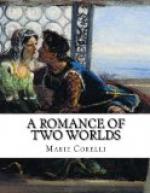forms and exquisite faces of the women, and the splendid
strength and godlike beauty of the men. A brief
glance was sufficient to show me that the moving spring
of all the civilization of this radiant planet was
the love of Nature and Art united. There were
no wars—for there were no different nations.
All the inhabitants were like one vast family; they
worked for one another, and vied with each other in
paying homage to those of the loftiest genius among
them. They had one supreme Monarch to whom they
all rendered glad obedience; and he was a Poet, ready
to sacrifice his throne with joy as soon as his people
should discover a greater than he. For they all
loved not the artist but the Art; and selfishness
was a vice unknown. Here, none loved or were wedded
save those who had spiritual sympathies, and here,
too, no creature existed who did not believe in and
worship the Creator. The same state of things
existed in Jupiter, the planet we next visited, where
everything was performed by electricity. Here
persons living hundreds of miles apart could yet converse
together with perfect ease through an electric medium;
ships ploughed the seas by electricity; printing,
an art of which the dwellers on Earth are so proud,
was accomplished by electricity—in fact,
everything in the way of science, art, and invention
known to us was also known in Jupiter, only to greater
perfection, because tempered and strengthened by an
electric force which never failed. From Jupiter,
Azul guided me to many other fair and splendid worlds—yet
none of them were Paradise; all had some slight drawback—some
physical or spiritual ailment, as it were, which had
to be combated with and conquered. All the inhabitants
of each star longed for something they had not—something
better, greater, and higher—and therefore
all had discontent. They could not realize their
best desires in the state of existence they then were,
therefore they all suffered disappointment. They
were all compelled to work in some way or another;
they were all doomed to die. Yet, unlike the
dwellers on Earth, they did not, because their lives
were more or less constrained and painful, complain
of or deny the goodness of God—on the contrary,
they believed in a future state which should be as
perfect as their present one was imperfect; and the
chief aim and object of all their labours was to become
worthy of attaining that final grand result—Eternal
Happiness and Peace.
“Readest thou the lesson in these glowing spheres, teeming with life and learning?” murmured Azul to me, as we soared swiftly on together. “Know that not one smallest world in all the myriad systems circling before thee, holds a single human creature who doubts his Maker. Not one! except thine own doomed star! Behold it yonder—sparkling feebly, like a faint flame amid sunshine—how poor a speck it is—how like a scarcely visible point in all the brilliancy of the ever-revolving wheel of Life! Yet there dwell the dwarfs of




